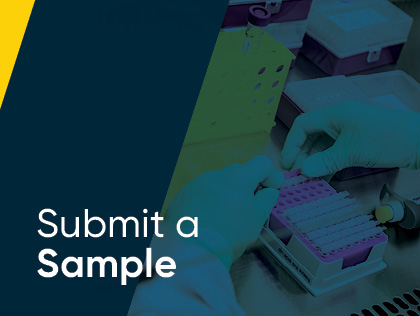Submitting Samples to NBDC
The National Bee Diagnostic Centre is currently open to receive samples and provide support to beekeepers and industry. Updates will be provided if changes in services occur.
The NBDC offers diagnostic services for the detection of the most common honey bee pathogens: American Foulbrood, European Foulbrood, Nosema, Varroa mites, Tracheal mites and Viruses.
The NBDC also offers chemical residue analysis services for honey, bee, pollen and propolis samples through the Chemistry Laboratory of Agriculture and Rural Development – Government of Alberta in Edmonton.
Navigate through the drop down menus to find information on how to send a sample for testing. Please complete the online submission form to send a request for services to the NBDC.
Sampling approach
Depending on the concern, some samples may be taken per apiary or per colony.
- When the main interest is overall apiary health, a composite sample of adult bees from eight randomly selected colonies in each apiary will be required (we recommend one (1) composite sample for up to 1,000 colonies).
- When a specific colony is the main concern, one sample of adult bees or comb from this colony will be required.
Apiary |
Colony |
|
|
Sample Type and Amount Required
The type and amount of sample required depends on the disease or condition suspected.
Suspected Disease/Condition |
Sample Type and Amount |
| Nosema and Tracheal mites | Adult bees from the honey frame (120 bees required) |
| Varroa mites | Adult bees from the brood frame (300 bees required) |
| American Foulbrood (AFB) and European Foulbrood (EFB) |
|
| Viruses | Live adult bees or diseased brood bees required |
| Chemical toxicity (residue) |
|
| Antibiotic residues in honey | Honey (20 g required) |
Sampling Procedure
It is recommended to examine frames of the entire colony to find the queen before taking any samples. This will ensure that the queen will not end up in the sample container.
Comb sample
Cut a piece of brood comb about 10 cm x 10 cm (Fig. 1) containing the suspected diseased brood. Wrap the sample in paper towels or newsprint and send it packaged loosely in a cardboard box. Avoid honey, pollen or nectar in the sample and do NOT put samples in a plastic or airtight container. If possible, send one full frame with eggs and larvae at multiple stages.
Adult Bees
Collect bees in 30 dram vials (~120mL) (Fig. 2). The NBDC will provide sample containers upon request. Similar containers can be purchased at local stores (e.g. urine sample container or plastic honey jars). Keep in the freezer until ready to submit.
Live adult bees (for viral analysis):
Collect adult bees and transfer to a live bee shipping box (Fig. 3) or use a plastic vial and add a queen candy or a sugar cube. If using a plastic vial, ensure container is aerated by making a few holes on the lid or on side of the container. Bees must be shipped alive in order to preserve RNA integrity for viral testing.
Honey
Collect in a glass or plastic container with a screw cap. Please seal the container properly to avoid leakage. Keep in a cool place or refrigerate until able to send.
Pollen
Collect from a pollen trap or bee bread from the brood frame (Fig. 4) in a plastic container with a screw cap. Keep in the freezer until ready to submit.
Propolis
Scrape propolis with a hive tool while avoiding contamination with bee parts, paint or wood in the sample as best as possible. Propolis can be tested in its resin form or in alcohol.
Labelling
Sample containers must indicate:
- Beekeeper’s name
- Colony ID, if a composite sample write Apiary ID
- Date of sample collection
- Type of sample (e.g. honey frame; brood frame, etc.)
* Please use permanent marker to record information
Package preparation
- Check that all sample containers/boxes are properly sealed and labelled (if possible, send samples that were frozen with ice packs).
- Complete online submission form.
Shipment
Submit samples using Express or Priority service. We suggest samples are sent on a Monday or Tuesday, so they arrive during the business week (Mon-Fri). Samples may also be dropped off at our office. Canada Post is the only carrier that will ship live bees; if you are sending live samples, send via Canada Post, express service.
Mailing Address
Canada Post Shipments
National Bee Diagnostic Centre
P.O. Box 1118
Beaverlodge, AB T0H 0C0
Other Couriers
National Bee Diagnostic Centre
100038A TWP RD 720
Beaverlodge, AB T0H 0C0
Results
Results will be available within two weeks of sample receipt in the lab. Chemical residue analyses will be complete within three weeks of receipt.
Fee Schedule
NBDC Diagnostic Services
Services |
Fee |
| Africanized genetics | $60.00 |
| Nosema count | $20.00 |
| Varroa mites count | $20.00 |
| Tracheal mite detection | $33.00 |
| Nosema species identification | $33.00 |
| American Foulbrood detection | $33.00 |
| European Foulbrood detection | $33.00 |
| Chalk brood detection | $33.00 |
| Queen health assessment | $33.00 |
| Antibiotic resistance - European or American Foulbrood | $27.00 |
| Malpighamaoeba mellificae | $45.00 |
| Virus detection/quantification - each | $45.00 |
| Virus detection – 3 viruses | $120.00 |
| Virus detection – 5 viruses | $185.00 |
| Virus detection – 7 viruses | $250.00 |
| Virus detection – 9 viruses | $300.00 |
Chemical Residue Testing
Testing is conducted at the Chemistry Lab of Agriculture & Rural Development - Government of Alberta
Antibiotic Residues in Honey |
|
|
Test |
Analytes |
Fee |
| Honey Quality Package |
|
$210.00 |
| Fumagillin |
|
$50.00 |
| Tetracycline Antibiotics |
|
$100.00 |
| Tylosin Antibiotics |
|
$50.00 |
| Glyphosate |
|
$50.00 |
| Quinclora |
|
$50.00 |
Pesticide Residue Analysis |
|
|
| Synthetic Acaricides |
|
$150.00 |
Payment
Customers will be invoiced directly by Northwestern Polytechnic. Please contact NWP directly for payment options:
| Financial Services | |
|---|---|
| Office: C314 Phone: 780-539-2026 Fax: 780-539-2832 Email: finance@nwpolytech.ca | |
Contact Us
For more information about submitting samples, please contact:
| NWP National Bee Diagnostic Centre | |
|---|---|
| Office: BVE104 Phone: 780-357-7737 Email: nbdc@nwpolytech.ca | |
















